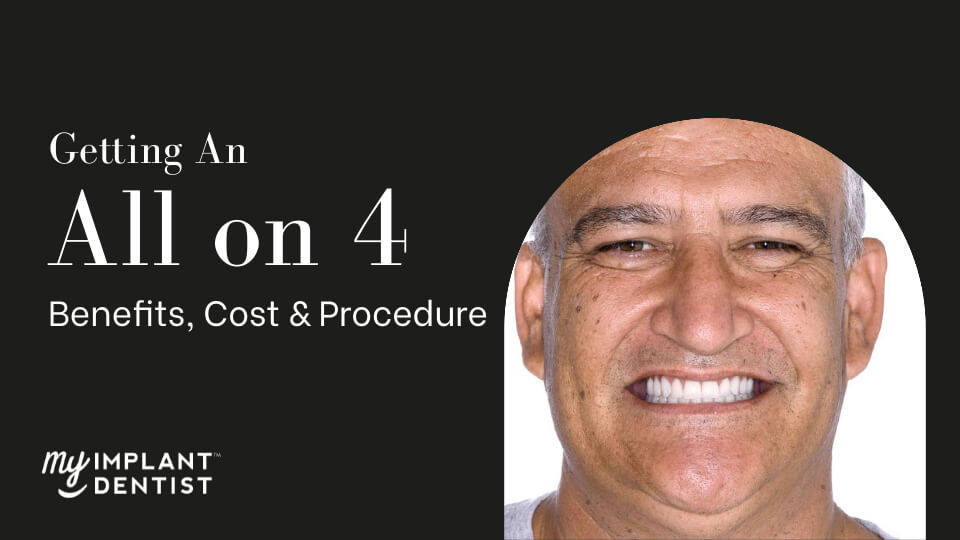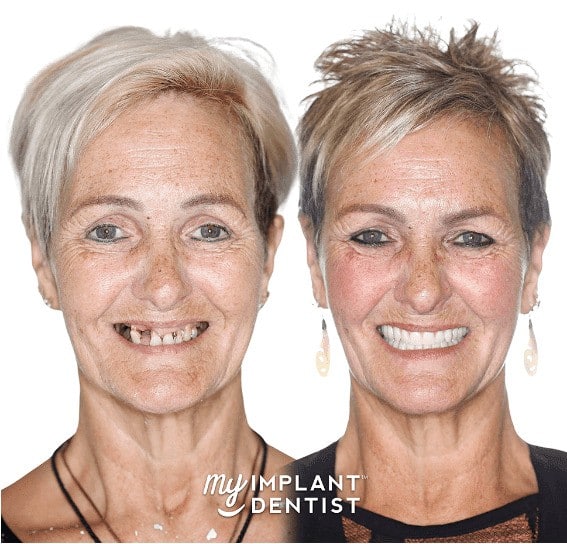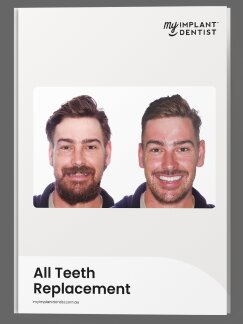
Contents
- 1 What Are All-on-4 Implants?
- 2 How the All-On-Four Procedure Works
- 3 What to Expect During the All On Four Dental Implant Procedure
- 4 The Options Available for the All-On-Four Procedure
- 5 How Much Does an All On Four Implant Cost?
- 6 The Process & Benefits of Getting an All On Four Implants
- 7 All-on-4 Dental Implants VS Traditional Dental Implants
- 8 All-on-4 Dental Implants VS Dentures
- 9 Are You a Good Candidate for All On Four Dental Implant?
- 10 faqs
What Are All-on-4 Implants?
All-on-4 implants are a revolutionary dental solution that replaces a full arch of missing teeth with just four strategically placed dental implants. This innovative technique provides a secure and permanent foundation for a custom-made set of teeth, restoring both function and aesthetics. With All-on-4 implants, patients can enjoy a natural-looking smile and regain their ability to eat, speak, and live confidently.

How the All-On-Four Procedure Works
The four implants in the jaw bone are used to support a fixed prosthesis that can be fitted within 24 hours of surgery. The bone tissues integrate with the four implants after they are placed, forming a solid point of attachment for the dental prosthesis.
We start the procedure at My Implant Dentist by making sure you’re comfortable. After that, anesthesia is administered. The implants will then be installed after your mouth has been prepared. Broken or decayed teeth and diseased or infected tissue in the mouth and jaw must be removed.
During the implantation procedure, titanium posts will be inserted into the jawbone. Two implants are usually placed in the front of the mouth and two in the back to distribute force evenly across the denture. The surgical sites will be sutured after this process is completed. Finally, you’ll be taken to recovery to unwind and recover from your anesthetic.
What to Expect During the All On Four Dental Implant Procedure
The All On Four Dental Implant procedure is typically performed under local anesthesia to minimize pain and discomfort. The procedure usually takes a few hours to complete, and patients can return home on the same day.
Before the procedure, your dentist will create a personalized treatment plan based on your individual needs and dental health. This may involve taking X-rays or CT scans to evaluate the bone structure and plan the placement of the implants.
During the procedure, your dentist will make small incisions in the gum tissue to access the jawbone. The implants will be placed in the jawbone at specific angles to ensure maximum stability and support for the prosthetic teeth. After the implants are in place, your dentist will attach a temporary set of teeth to the implants. These temporary teeth will remain in place for several months while the implants fuse with the jawbone.
After the osseointegration process is complete, your dentist will create a custom set of prosthetic teeth that are designed to match the shape and color of your natural teeth. The prosthetic teeth will be attached to the implants using abutments, which are small metal connectors that hold the teeth securely in place.
Recovery Period
After the procedure, it’s normal to experience some swelling, bruising, and discomfort for a few days. Your dentist may prescribe pain medications or antibiotics to manage pain and prevent infection.
It’s important to follow your dentist’s instructions for post-operative care carefully. This may include:
- Eating soft foods for the first few days after the procedure
- Rinsing your mouth with saltwater to promote healing
- Avoiding smoking and alcohol consumption
- Keeping the area around the implants clean to prevent infection
Most patients can resume their normal activities within a few days of the procedure, although it’s important to avoid strenuous activity and exercise for a few weeks.
The Options Available for the All-On-Four Procedure
Implant-Supported Dentures are available in two types today.
- Bar Retained – With the Bar Retained option, we can use a thin metal bar that follows the contours of the jaw. The implants are then attached to the bar. After all of this is in place, attachments or clips on the denture are used to secure the two pieces together.
- Ball Retained – The mechanism used to attach the denture is the most significant difference between the Bar Retained and the Ball Retained options. As the name implies, the implants are attached to a ball-shaped attachment. They are then secured and locked on the denture implants with a socket-like feature. Many clients consider it to be the most popular and preferred option. It would help if you spoke with one of our excellent dentists about your options for supported dentures so that you can make the best decision possible.
How Much Does an All On Four Implant Cost?
An All-On-4 implant typically costs from $19,000 to $35,000 per jaw, depending on various factors such as location, the complexity of the case, and additional treatments required.
Factors Affecting the Cost of All-on-4
Here are the factors that influence the cost of All-on-4:
- The dental practice’s geographical location
- Additional oral surgery may be required.
- The dentist’s, prosthodontist’s, an oral surgeon’s expertise
- Individual practices have different pricing.
- Promotions that are specific to each dental practice
The Process & Benefits of Getting an All On Four Implants
The Treatment Is Fast.
We can place your dentures on the same day as your implants at My Implant Dentist; as a result, you can start enjoying your new smile right away! There’s no need to put off the cosmetic benefits of having your teeth restored for a long time.
Traditional dentures take longer to fit and produce better results than All-on-4. In fact, All-on-4 implant installation times are faster than other implant types, and once the implants are in place, jaw bone loss is often avoided.
Recovery Time Is Reduced
At My Implant Dentist, we can restore your entire arch with just four implants. As a result, the procedure takes only a few minutes to complete in the dental chair, and the recovery time is significantly reduced.
Comfort Is Enhanced
Traditional dentures have a tendency to slide around in the mouth. Dentures become uncomfortable without a proper anchor to keep them in place. Traditional dentures cause people to smile less and have difficulty eating the foods they used to enjoy. All-on-4 implants solve this problem by creating an anchor that can be attached to a custom-made implant.
The tooth implant does not move around inside the mouth because it is securely attached to the four anchors. As a result of All-on-4 technology, patients are able to smile, chew, and participate in all of the activities they’ve always enjoyed. As a result, All-on-4 dental implants and restorations are far more comfortable than traditional dentures.
There’s No Need For Dental Adhesive!
Patients with traditional dentures must constantly be concerned that their dentures will fall out or slip while eating, talking, or smiling. Conventional dentures require dental adhesive to keep them in place, but All-on-4 implants are securely fastened to four solid anchors in the mouth, eliminating the need for dental adhesive. It’s all on. With All-on-4, four implants in the jaw support a full fixed bridge. A dental adhesive isn’t required!
The benefits of dental implants include improved oral health, improved appearance, and improved speech.
Bone Grafting Is Not Required With All-on-4 Implants
Even in patients who have been told they can’t get implants, the All-on-4 system reduces the need for bone graft surgery. The All-on-4 treatment ensures enhanced stability in the existing bone tissue by using angulated implants to overcome any deficiencies in the jaw bone. All-on-4 implants are suitable for patients who have lost bone mass.
All-on-4 Dental Implants VS Traditional Dental Implants
All-on-4 dental implants have several advantages over traditional dental implants. For one, they require fewer implants to support a full arch of teeth, which means that the procedure is less invasive and typically involves less surgery. Additionally, all-on-4 dental implants can often be placed without the need for a bone graft, which can save time and money. Finally, all-on-4 dental implants can often be loaded immediately, which means that the patient can have their new teeth placed on the same day as the surgery.
All-on-4 Dental Implants VS Dentures
All-on-4 dental implants have several advantages over dentures. For one, they are more stable and secure than dentures, which means that the patient does not have to worry about their teeth shifting or falling out. Additionally, all-on-4 dental implants look and feel more natural than dentures, which can improve the patient’s self-confidence and quality of life. Finally, all-on-4 dental implants do not need to be removed and cleaned like dentures, which can be a significant advantage for some patients.
Are You a Good Candidate for All On Four Dental Implant?
If you are considering All On Four Dental Implant as a treatment option, it’s important to determine whether you are a good candidate for the procedure. All On Four Dental Implant may be a suitable option for you if you:
- Have multiple missing teeth in an arch
- Are in good overall health
- Have sufficient bone density and volume in the jawbone
- Have healthy gums and no signs of gum disease
- Are willing to commit to good oral hygiene practices and regular dental check-ups
A consultation with a qualified dentist is necessary to determine whether All On Four Dental Implant is the right option for you. During the consultation, the dentist will evaluate your dental health and bone structure to determine whether you have sufficient bone density and volume to support the implants. If you do not have enough bone density or volume, your dentist may recommend bone grafting to rebuild the jawbone.
In some cases, patients may require additional posterior implants to support the prosthetic teeth adequately. Your dentist will evaluate your specific needs and recommend the appropriate treatment plan.
All On Four Dental Implant offers several benefits over traditional implant procedures. For example, it requires fewer implants than traditional implants, which means that it may be a suitable option for patients who have limited jawbone density or volume. Additionally, All On Four Dental Implant can often be completed in a single day, which makes it a convenient option for patients who want to restore their smile quickly.
faqs
What Should I Eat After Getting All-on-4?
Chewing with your All-on-4 dentures will feel completely natural, thanks to the strong foundation created by the implants fusing with your jawbone. After your implant surgery, you should be able to eat most foods within a few days. However, for the first few months, while you recover, it’s best to avoid foods that are particularly hard, chewy, or brittle.
How are all four dental implants put in?
After placing a minimum of four dental implants, a mould of your mouth is taken. Our dental technicians will then use this information to create a set of custom-made new teeth attached to the dental implants. You’ll be able to leave the clinic that evening and go home, where you’ll be able to eat normally once more.
How long do All-on-4 dental implants take?
The All-on-4 implant procedure can take four to six months to complete. Those who require additional dental work may have to wait longer, adding another month or two to the overall process.
Can All-on-4 dental implants be removed?
All-on-four implants are dental implants that entirely replace a patient’s top or bottom teeth with four individual titanium screws. These dental implants are permanent teeth that can be brushed and cleaned and do not need to be removed, allowing the patient to smile usually again.




















